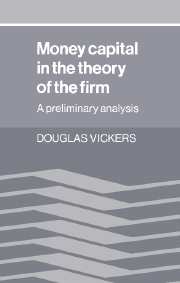1 - The firm in a monetary economy
Published online by Cambridge University Press: 18 September 2009
Summary
Time, uncertainty, and money form an analytical triad that economic theory, if it aspires to realism and relevance, must take seriously into account. The historic, unidirectional flow of time carries with it the inescapable reality of uncertainty and the ignorance in which we are bound. Our analytical constructions that aim to explain the world must confront the influence, the ineluctabilities, with which the passing of time presses on our experience and understanding. Knowledge, it has been said, cannot be gained before its time (Lachmann, 1959, p. 73). Alfred Marshall, the architect of English neoclassical economics, cautioned that “we cannot foresee the future perfectly. The unexpected may happen” (1920, p. 347), and he pointed to the difficulties that arise, as a result, for economic decisions and action. Keynes's observation, when contemplating the impact of the future on economic behavior, that “we simply do not know” (1937, p. 185), recalls his well-known indictment of the classical economics and its attempt to evade the future by a probabilistic reductionism.
Many issues in the theory of the firm are brought into focus by these considerations. Terence Hutchison, whose work has provided luminous perspectives on economic thought, has seen these issues laced together in their interdependence.
- Type
- Chapter
- Information
- Money Capital in the Theory of the FirmA Preliminary Analysis, pp. 3 - 21Publisher: Cambridge University PressPrint publication year: 1987



